Forum
-
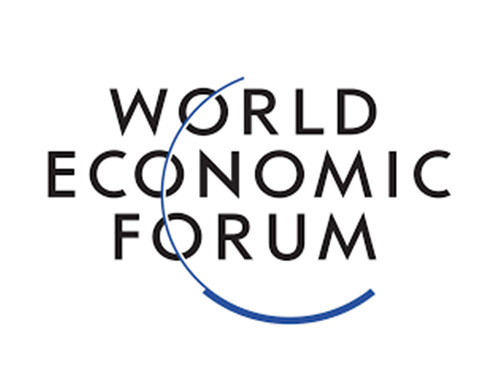 HUBO to Present at the 2016 World Economic Forum
KAIST researchers will lead an IdeasLab on biotechnology for an aging society while HUBO, the winner of the 2015 DARPA Robotics Challenge, will interact with the forum participants, offering an experience of state-of-the-art robotics technology.
Representatives from KAIST will attend the 2016 Annual Meeting of the World Economic Forum to run an IdeasLab and showcase its humanoid robot.
With over 2,500 leaders from business, government, international organizations, civil society, academia, media, and the arts expected to participate, the 2016 Annual Meeting will take place on January 20-23, 2016 in Davos-Klosters, Switzerland. Under the theme of “Mastering the Fourth Industrial Revolution,” global leaders will discuss the period of digital transformation that will have profound effects on economies, societies, and human behavior.
President Sung-Mo Kang will join the Global University Leaders Forum (GULF), a high-level academic meeting to foster collaboration among experts on issues of global concern for the future of higher education and the role of science in society. He will discuss how the emerging revolution in technology will affect the way universities operate and serve society. KAIST is the only Korean university participating in GULF, which is composed of prestigious universities invited from around the world.
Four KAIST professors, including Distinguished Professor Sang Yup Lee of the Chemical and Biomolecular Engineering Department, will lead an IdeasLab on “Biotechnology for an Aging Society.”
Professor Lee said, “In recent decades, much attention has been paid to the potential effect of the growth of an aging population and problems posed by it. At our IdeasLab, we will introduce some of our research breakthroughs in biotechnology to address the challenges of an aging society.”
In particular, he will present his latest research in systems biotechnology and metabolic engineering. His research has explained the mechanisms of how traditional Oriental medicine works in our bodies by identifying structural similarities between effective compounds in traditional medicine and human metabolites, and has proposed more effective treatments by employing such compounds.
KAIST will also display its networked mobile medical service system, “Dr. M.” Built upon a ubiquitous and mobile Internet, such as the Internet of Things, wearable electronics, and smart homes and vehicles, Dr. M will provide patients with a more affordable and accessible healthcare service.
In addition, Professor Jun-Ho Oh of the Mechanical Engineering Department will showcase his humanoid robot, “HUBO,” during the Annual Meeting. His research team won the International Humanoid Robotics Challenge hosted by the United States Defense Advanced Research Projects Agency (DARPA), which was held in Pomona, California, on June 5-6, 2015. With 24 international teams participating in the finals, HUBO completed all eight tasks in 44 minutes and 28 seconds, 6 minutes earlier than the runner-up, and almost 11 minutes earlier than the third-place team. Team KAIST walked away with the grand prize of USD 2 million.
Professor Oh said, “Robotics technology will grow exponentially in this century, becoming a real driving force to expedite the Fourth Industrial Revolution. I hope HUBO will offer an opportunity to learn about the current advances in robotics technology.”
President Kang pointed out, “KAIST has participated in the Annual Meeting of the World Economic Forum since 2011 and has engaged with a broad spectrum of global leaders through numerous presentations and demonstrations of our excellence in education and research. Next year, we will choreograph our first robotics exhibition on HUBO and present high-tech research results in biotechnology, which, I believe, epitomizes how science and technology breakthroughs in the Fourth Industrial Revolution will shape our future in an unprecedented way.”
2015.11.18 View 13849
HUBO to Present at the 2016 World Economic Forum
KAIST researchers will lead an IdeasLab on biotechnology for an aging society while HUBO, the winner of the 2015 DARPA Robotics Challenge, will interact with the forum participants, offering an experience of state-of-the-art robotics technology.
Representatives from KAIST will attend the 2016 Annual Meeting of the World Economic Forum to run an IdeasLab and showcase its humanoid robot.
With over 2,500 leaders from business, government, international organizations, civil society, academia, media, and the arts expected to participate, the 2016 Annual Meeting will take place on January 20-23, 2016 in Davos-Klosters, Switzerland. Under the theme of “Mastering the Fourth Industrial Revolution,” global leaders will discuss the period of digital transformation that will have profound effects on economies, societies, and human behavior.
President Sung-Mo Kang will join the Global University Leaders Forum (GULF), a high-level academic meeting to foster collaboration among experts on issues of global concern for the future of higher education and the role of science in society. He will discuss how the emerging revolution in technology will affect the way universities operate and serve society. KAIST is the only Korean university participating in GULF, which is composed of prestigious universities invited from around the world.
Four KAIST professors, including Distinguished Professor Sang Yup Lee of the Chemical and Biomolecular Engineering Department, will lead an IdeasLab on “Biotechnology for an Aging Society.”
Professor Lee said, “In recent decades, much attention has been paid to the potential effect of the growth of an aging population and problems posed by it. At our IdeasLab, we will introduce some of our research breakthroughs in biotechnology to address the challenges of an aging society.”
In particular, he will present his latest research in systems biotechnology and metabolic engineering. His research has explained the mechanisms of how traditional Oriental medicine works in our bodies by identifying structural similarities between effective compounds in traditional medicine and human metabolites, and has proposed more effective treatments by employing such compounds.
KAIST will also display its networked mobile medical service system, “Dr. M.” Built upon a ubiquitous and mobile Internet, such as the Internet of Things, wearable electronics, and smart homes and vehicles, Dr. M will provide patients with a more affordable and accessible healthcare service.
In addition, Professor Jun-Ho Oh of the Mechanical Engineering Department will showcase his humanoid robot, “HUBO,” during the Annual Meeting. His research team won the International Humanoid Robotics Challenge hosted by the United States Defense Advanced Research Projects Agency (DARPA), which was held in Pomona, California, on June 5-6, 2015. With 24 international teams participating in the finals, HUBO completed all eight tasks in 44 minutes and 28 seconds, 6 minutes earlier than the runner-up, and almost 11 minutes earlier than the third-place team. Team KAIST walked away with the grand prize of USD 2 million.
Professor Oh said, “Robotics technology will grow exponentially in this century, becoming a real driving force to expedite the Fourth Industrial Revolution. I hope HUBO will offer an opportunity to learn about the current advances in robotics technology.”
President Kang pointed out, “KAIST has participated in the Annual Meeting of the World Economic Forum since 2011 and has engaged with a broad spectrum of global leaders through numerous presentations and demonstrations of our excellence in education and research. Next year, we will choreograph our first robotics exhibition on HUBO and present high-tech research results in biotechnology, which, I believe, epitomizes how science and technology breakthroughs in the Fourth Industrial Revolution will shape our future in an unprecedented way.”
2015.11.18 View 13849 -
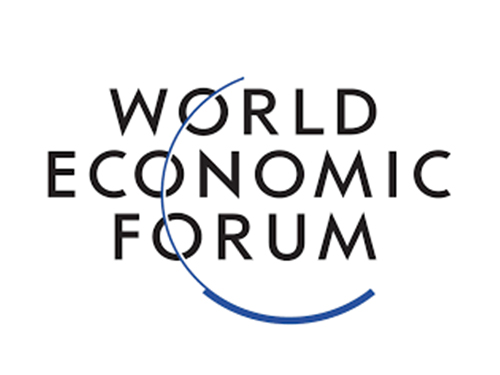 KAIST Participates in the World Economic Forum's Annual Meeting of the New Champions 2015 in China
KAIST’s president and its professors actively engage in discussions of major issues on higher education, technology innovation, and industry-university collaboration with global leaders from across all sectors.
President Steve Kang of KAIST participated in the Annual Meeting of the New Champions 2015 (a.k.a., Summer Davos Forum) hosted by the World Economic Forum (WEF). With the theme of “Charting a New Course for Growth,” the Summer Davos Forum took place on September 9-11, 2015 in, Dalian, China.
Currently, KAIST is a member of the Global University Leaders Forum (GULF) of WEF, a gathering of the presidents of the top 25 universities in the world, including Harvard University, Massachusetts Institute of Technology, University of Tokyo, University of Oxford, Peking University, and National University of Singapore. GULF allows university leaders an opportunity to have high-level dialogues on higher education and research and explore prospects for cooperative ventures.
President Kang led the discussion of the GULF session at the Summer Davos Forum, which was held on September 10, 2015, with 25 university leaders as well as two business leaders from Chinese companies: Huawei Technologies Co. Ltd., and Sanofi China. The participants shared candid perspectives on industry-university collaboration, particularly the need for such partnerships in Asia.
In addition, KAIST hosted the fourth IdeasLab session, entitled “Bio versus Nano Materials, on September 9, 2015. At the session, four KAIST professors held an in-depth debate and discussion with the audience on whether the next industrial revolution would be driven by advances in biomaterials or nanomaterials.
The topics under discussion were:
- New materials that mimic biology by Professor Hea Shin Lee
- Bio-based materials that replace petroleum-based materials by Professor Sang Yup Lee
- New materials designed at sub-nano scale by Professor Hee Tae Jung
- A hydrogen economy with nanomaterials by Professor Eun Ae Cho
Since its establishment in 2007, the Summer Davos Forum has become the biggest business and political gathering in Asia, held annually either in Dalian or Tianjin, China. The Forum has attracted more than 1,500 participants primarily from emerging nations such as China, India, Russia, Mexico, and Brazil, and has offered an open platform to address issues important to the region and the global community.
2015.09.14 View 9755
KAIST Participates in the World Economic Forum's Annual Meeting of the New Champions 2015 in China
KAIST’s president and its professors actively engage in discussions of major issues on higher education, technology innovation, and industry-university collaboration with global leaders from across all sectors.
President Steve Kang of KAIST participated in the Annual Meeting of the New Champions 2015 (a.k.a., Summer Davos Forum) hosted by the World Economic Forum (WEF). With the theme of “Charting a New Course for Growth,” the Summer Davos Forum took place on September 9-11, 2015 in, Dalian, China.
Currently, KAIST is a member of the Global University Leaders Forum (GULF) of WEF, a gathering of the presidents of the top 25 universities in the world, including Harvard University, Massachusetts Institute of Technology, University of Tokyo, University of Oxford, Peking University, and National University of Singapore. GULF allows university leaders an opportunity to have high-level dialogues on higher education and research and explore prospects for cooperative ventures.
President Kang led the discussion of the GULF session at the Summer Davos Forum, which was held on September 10, 2015, with 25 university leaders as well as two business leaders from Chinese companies: Huawei Technologies Co. Ltd., and Sanofi China. The participants shared candid perspectives on industry-university collaboration, particularly the need for such partnerships in Asia.
In addition, KAIST hosted the fourth IdeasLab session, entitled “Bio versus Nano Materials, on September 9, 2015. At the session, four KAIST professors held an in-depth debate and discussion with the audience on whether the next industrial revolution would be driven by advances in biomaterials or nanomaterials.
The topics under discussion were:
- New materials that mimic biology by Professor Hea Shin Lee
- Bio-based materials that replace petroleum-based materials by Professor Sang Yup Lee
- New materials designed at sub-nano scale by Professor Hee Tae Jung
- A hydrogen economy with nanomaterials by Professor Eun Ae Cho
Since its establishment in 2007, the Summer Davos Forum has become the biggest business and political gathering in Asia, held annually either in Dalian or Tianjin, China. The Forum has attracted more than 1,500 participants primarily from emerging nations such as China, India, Russia, Mexico, and Brazil, and has offered an open platform to address issues important to the region and the global community.
2015.09.14 View 9755 -
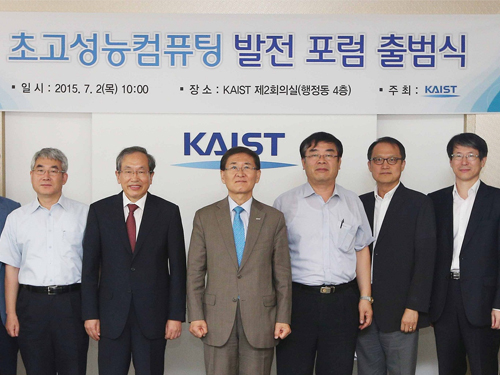 Experts Gather to Develop a Korean Supercomputer on KAIST Campus
KAIST hosted an inauguration ceremony for the Super-Capacity Computing Advancement Forum on July 2, 2015, to increase Korea's national computing capacity. It represents a gathering consisting of experts drawn across industry, university, and institutes in super-capacity computing.
More than ten experts from the university, including President Steve Kang and Professor Oh-Joon Kwon of the Department of Aerospace Engineering, attended the ceremony. This forum was created to secure a competitive edge in the global market by establishing a long-term strategy for the development of super computers.
The recent rise of new service industries, such as voice recognition, artificial intelligence, and the Internet of Things, has increased the need for super-capacity computing to deal more rapidly with big data. The need is made more urgent by increased investment by leading countries in this field.
The forum will organize and operate working-level subcommittees to promote in-depth discussions on issues related to super-capacity computing systems. Open forums and public hearings will be held until October, to gather information and insights needed to advance the field.
President Steve Kang, the Chairman of the Forum, said, “The forum will have a great impact on Korea’s effort to become a world leader in super-capacity computing. We plan to debate the pros and cons of potential solutions to the Korean government, to assist them in building the nation’s competitiveness in super-capacity computing capability.”
2015.07.07 View 7386
Experts Gather to Develop a Korean Supercomputer on KAIST Campus
KAIST hosted an inauguration ceremony for the Super-Capacity Computing Advancement Forum on July 2, 2015, to increase Korea's national computing capacity. It represents a gathering consisting of experts drawn across industry, university, and institutes in super-capacity computing.
More than ten experts from the university, including President Steve Kang and Professor Oh-Joon Kwon of the Department of Aerospace Engineering, attended the ceremony. This forum was created to secure a competitive edge in the global market by establishing a long-term strategy for the development of super computers.
The recent rise of new service industries, such as voice recognition, artificial intelligence, and the Internet of Things, has increased the need for super-capacity computing to deal more rapidly with big data. The need is made more urgent by increased investment by leading countries in this field.
The forum will organize and operate working-level subcommittees to promote in-depth discussions on issues related to super-capacity computing systems. Open forums and public hearings will be held until October, to gather information and insights needed to advance the field.
President Steve Kang, the Chairman of the Forum, said, “The forum will have a great impact on Korea’s effort to become a world leader in super-capacity computing. We plan to debate the pros and cons of potential solutions to the Korean government, to assist them in building the nation’s competitiveness in super-capacity computing capability.”
2015.07.07 View 7386 -
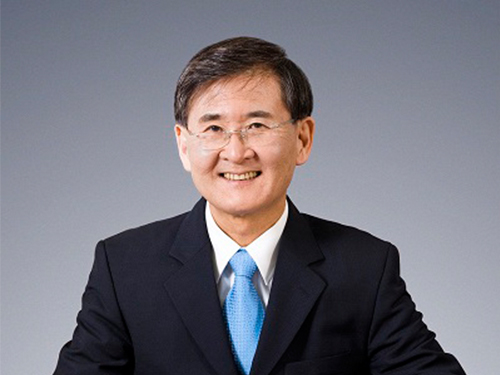 President Steve Kang of KAIST Attends the 2014 Summer Davos Forum in Tianjin, China
President Steve Kang of KAIST will attend the 2014 Annual Meeting of the New Champions, the World Economic Forum (WEF), to be held on September 10-12, 2014 in Tianjin, China.
KAIST holds its own IdeasLab session on nanotechnology on September 12, 2014.
On September 10, 2014, President Steve Kang will participate in a private session hosted by the Global University Leaders Forum (GULF) community at WEF as a panelist.
In addition to President Kang, eight presidents from top global universities such as the National University of Singapore, Peking University, ETH Zurich (Swiss Federal Institute of Technology), University of Tokyo, and Carnegie Mellon University will join the panel discussion under the topic, “Increasing the Translational Impact of University Research.” Specifically, the presidents will address issues related to the importance of university-led technology transfer in Asia, key strategies and goals for technology transfer, and implementation approaches taken by each university to promote technology transfer from university to industry.
President Kang was invited to this GULF session, the only attendant from Korean universities, in recognition of his long time experience and expertise in education and research.
In 2006, WEF created the GULF, a small community of the presidents of top universities in the world, aiming to offer an open platform for high-level dialogues on issues of higher education and research with other sectors, as well as to foster collaboration between universities in areas of significance for global policy.
As of 2014, a total of 25 globally leading universities, including Harvard University, University of Cambridge, and Massachusetts Institute of Technology, are GULF members. KAIST, which joined the club this year, is the only Korean university.
The 2014 Annual Meeting of the New Champions, also known as the Summer Davos Forum, hosts numerous sessions under the theme of “Creating Value through Innovation.” At the Forum, a total of ten IdeasLab sessions will be hosted. KAIST was invited to run its own IdeasLab on nanotechnology on September 12, 2014.
Together with President Kang, Professors Sang Ouk Kim and Keon Jae Lee from the Department of Materials Science Engineering, KAIST, and Professors Sang Yup Lee and Hyunjoo Lee from the Department of Chemical and Biomolecular Engineering, KAIST, will present their own speeches on the topic entitled “From diagnostics to materials, how is nanotechnology changing lives?”
President Kang will give the opening speech at the KAIST IdeasLab.
He said that an invitation from WEF to join the IdeasLab spoke well for KAIST:
“KAIST is the first and the only Korean university ever invited to run its own IdeasLab at the World Economic Forum. The IdeasLab is an expert group meeting, conducted only by the world’s most prestigious universities and research institutes. At the IdeasLab sessions, global leaders from different sectors identify major issues facing higher education and humanity and explore solutions through science and technology innovation. Holding our own IdeasLab on one of our strongest fields, nanotechnology, is indeed an excellent opportunity for KAIST to show its strength in academic and research excellence on the global stage.”
2014.09.08 View 15943
President Steve Kang of KAIST Attends the 2014 Summer Davos Forum in Tianjin, China
President Steve Kang of KAIST will attend the 2014 Annual Meeting of the New Champions, the World Economic Forum (WEF), to be held on September 10-12, 2014 in Tianjin, China.
KAIST holds its own IdeasLab session on nanotechnology on September 12, 2014.
On September 10, 2014, President Steve Kang will participate in a private session hosted by the Global University Leaders Forum (GULF) community at WEF as a panelist.
In addition to President Kang, eight presidents from top global universities such as the National University of Singapore, Peking University, ETH Zurich (Swiss Federal Institute of Technology), University of Tokyo, and Carnegie Mellon University will join the panel discussion under the topic, “Increasing the Translational Impact of University Research.” Specifically, the presidents will address issues related to the importance of university-led technology transfer in Asia, key strategies and goals for technology transfer, and implementation approaches taken by each university to promote technology transfer from university to industry.
President Kang was invited to this GULF session, the only attendant from Korean universities, in recognition of his long time experience and expertise in education and research.
In 2006, WEF created the GULF, a small community of the presidents of top universities in the world, aiming to offer an open platform for high-level dialogues on issues of higher education and research with other sectors, as well as to foster collaboration between universities in areas of significance for global policy.
As of 2014, a total of 25 globally leading universities, including Harvard University, University of Cambridge, and Massachusetts Institute of Technology, are GULF members. KAIST, which joined the club this year, is the only Korean university.
The 2014 Annual Meeting of the New Champions, also known as the Summer Davos Forum, hosts numerous sessions under the theme of “Creating Value through Innovation.” At the Forum, a total of ten IdeasLab sessions will be hosted. KAIST was invited to run its own IdeasLab on nanotechnology on September 12, 2014.
Together with President Kang, Professors Sang Ouk Kim and Keon Jae Lee from the Department of Materials Science Engineering, KAIST, and Professors Sang Yup Lee and Hyunjoo Lee from the Department of Chemical and Biomolecular Engineering, KAIST, will present their own speeches on the topic entitled “From diagnostics to materials, how is nanotechnology changing lives?”
President Kang will give the opening speech at the KAIST IdeasLab.
He said that an invitation from WEF to join the IdeasLab spoke well for KAIST:
“KAIST is the first and the only Korean university ever invited to run its own IdeasLab at the World Economic Forum. The IdeasLab is an expert group meeting, conducted only by the world’s most prestigious universities and research institutes. At the IdeasLab sessions, global leaders from different sectors identify major issues facing higher education and humanity and explore solutions through science and technology innovation. Holding our own IdeasLab on one of our strongest fields, nanotechnology, is indeed an excellent opportunity for KAIST to show its strength in academic and research excellence on the global stage.”
2014.09.08 View 15943 -
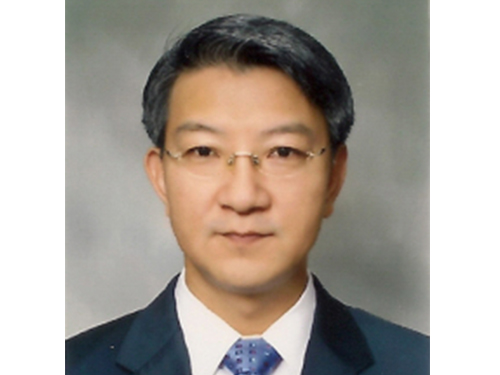 Distinguished Professor Sang Yup Lee Attends World Economic Forum's Workshop
Sang Yup Lee, Distinguished Professor of Chemical and Biomolecular Engineering at KAIST was invited to attend the Technology Pioneer and Global Growth Company CEO Workshop hosted by the World Economic Forum (WEF) on June 19-20, 2014 in San Francisco. During the workshop, Professor Lee joined a discussion on “disruptive technologies” as a panelist.
Currently serving for the evaluation committee that selects technology pioneers for the workshop, during the discussion, Professor Lee identified important issues facing humanity, analyzed the issues through forecasting, and presented converging disruptive technologies that provide solutions to the problems. He also shared the “ten emerging technologies” announced by the Global Agenda Council on Emerging Technologies, WEF and the Korean government’s technology innovation strategies adopted to achieve its economic development policy called creative economy.
2014.06.22 View 9810
Distinguished Professor Sang Yup Lee Attends World Economic Forum's Workshop
Sang Yup Lee, Distinguished Professor of Chemical and Biomolecular Engineering at KAIST was invited to attend the Technology Pioneer and Global Growth Company CEO Workshop hosted by the World Economic Forum (WEF) on June 19-20, 2014 in San Francisco. During the workshop, Professor Lee joined a discussion on “disruptive technologies” as a panelist.
Currently serving for the evaluation committee that selects technology pioneers for the workshop, during the discussion, Professor Lee identified important issues facing humanity, analyzed the issues through forecasting, and presented converging disruptive technologies that provide solutions to the problems. He also shared the “ten emerging technologies” announced by the Global Agenda Council on Emerging Technologies, WEF and the Korean government’s technology innovation strategies adopted to achieve its economic development policy called creative economy.
2014.06.22 View 9810 -
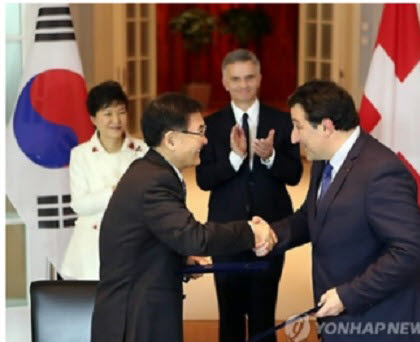 2014 Davos Forum: KAIST-EPFL Connection
The Korean-American Science and Technology News (KASTN), a biweekly global electronic newsletter carrying news and analyses in science and technology, as well as social, economic, and cultural issues related to the general interest of the Korean-American professional community, published an article on the partnership agreement made by KAIST and the Ecole Polytechnique Federale Lausanne (EPFL) during the 2014 World Economic Forum held at Davos, Switzerland, from January 22nd to 25th.
For the article, please click the link below: KASTN Issue 14-05, February 26, 2014
http://www.phy.duke.edu/~myhan/b_14-05.pdf
2014.02.04 View 9931
2014 Davos Forum: KAIST-EPFL Connection
The Korean-American Science and Technology News (KASTN), a biweekly global electronic newsletter carrying news and analyses in science and technology, as well as social, economic, and cultural issues related to the general interest of the Korean-American professional community, published an article on the partnership agreement made by KAIST and the Ecole Polytechnique Federale Lausanne (EPFL) during the 2014 World Economic Forum held at Davos, Switzerland, from January 22nd to 25th.
For the article, please click the link below: KASTN Issue 14-05, February 26, 2014
http://www.phy.duke.edu/~myhan/b_14-05.pdf
2014.02.04 View 9931 -
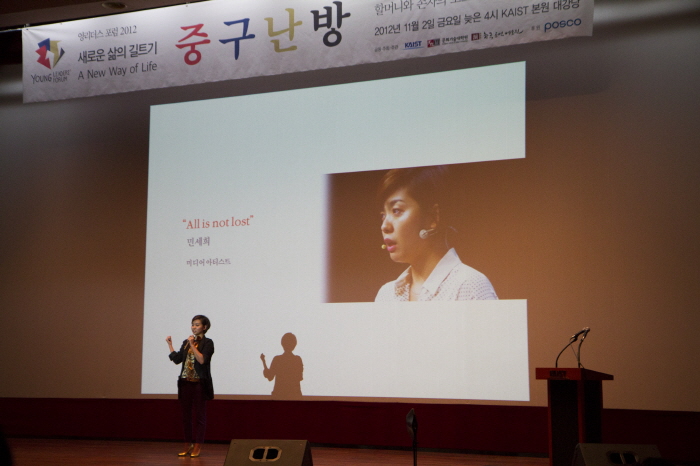 Collaborated Performance and Talk Battle Event Held by Graduate School of Culture Technology, KAIST
A unique event consisting of a new media performance and talk battle was held for middle school, high school, and college students during the winter break.
The Graduate School of Culture Technology at KAIST and the Korea Art Conservatory co-organized the 3rd Young Leaders Forum under the title “Collaboration of the Current and the New Culture” on January 18th at the Seoul Namsan Traditional Theater.
The Young Leaders Forum was founded to share knowledge and wisdom among different fields and generations and to foster creative lifestyles through the collaboration of wisdom.
The collaborated performance, “The Garden of Western Heaven”, was performed using new media technology by students from the Graduate School of Culture Technology and actors from the Korea Art Conservatory.
Three panels participated in the “Talk Battle” and held a discussion on “The New Culture from Performance and Collaboration”.
Woong-Rae Cho, CEO of The Mackiss Company, who sponsored the clay road in Gyejok Mountain and the Concert in the Forest, Professor Sung-Kuk Kim from School of Korean Music at Chung-Ang University, and Je-Ho Oh, a graduate student from the Graduate School of Culture Technology at KAIST participated in the discussion and shared their opinions with the audience.
2014.01.27 View 6876
Collaborated Performance and Talk Battle Event Held by Graduate School of Culture Technology, KAIST
A unique event consisting of a new media performance and talk battle was held for middle school, high school, and college students during the winter break.
The Graduate School of Culture Technology at KAIST and the Korea Art Conservatory co-organized the 3rd Young Leaders Forum under the title “Collaboration of the Current and the New Culture” on January 18th at the Seoul Namsan Traditional Theater.
The Young Leaders Forum was founded to share knowledge and wisdom among different fields and generations and to foster creative lifestyles through the collaboration of wisdom.
The collaborated performance, “The Garden of Western Heaven”, was performed using new media technology by students from the Graduate School of Culture Technology and actors from the Korea Art Conservatory.
Three panels participated in the “Talk Battle” and held a discussion on “The New Culture from Performance and Collaboration”.
Woong-Rae Cho, CEO of The Mackiss Company, who sponsored the clay road in Gyejok Mountain and the Concert in the Forest, Professor Sung-Kuk Kim from School of Korean Music at Chung-Ang University, and Je-Ho Oh, a graduate student from the Graduate School of Culture Technology at KAIST participated in the discussion and shared their opinions with the audience.
2014.01.27 View 6876 -
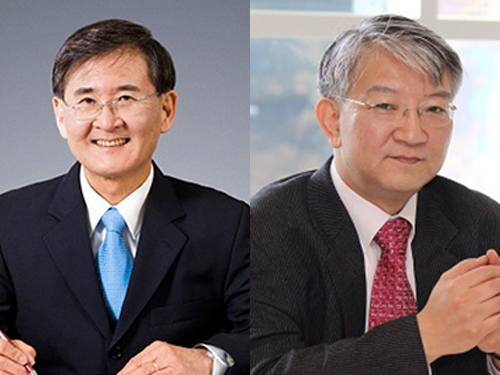 KAIST Participates in the 2014 Davos Forum on January 22-25 in Switzerland
Through the sessions of the Global University Leaders Forum, IdeasLab, and Global Agenda Councils on Biotechnology, KAIST participants will actively engage with global leaders in the discussion of issues on education innovation and technological breakthroughs.
The 2014 Annual Meeting of the World Economic Forum (WEF), known as the Davos Forum, will kick off on January 22-25 in Davos-Klosters, Switzerland, under the theme of "The Reshaping of the World: Consequences for Society, Politics, and Business." Each year, the Forum attracts about 2,500 distinguished leaders from all around the world and provides an open platform to identify the current and emerging challenges facing the global community and to develop ideas and actions necessary to respond to such challenges.
President Sung-Mo Steve Kang and Distinguished Professor Sang Yup Lee from the Department of Chemical and Biomolecular Engineering, KAIST, will attend the Forum and engage in a series of dialogues on such issues as Massive Open Online Courses, new paradigms for universities and researchers, the transformation of higher education, the role and value of scientific discoveries, and the impact of biotechnology on the future of society and business.
At the session entitled "New Paradigms for Universities of the Future" hosted by the Global University Leaders Forum (GULF), President Kang will introduce KAIST"s ongoing online education program, Education 3.0. GULF was created in 2006 by WEF, which is a small community of the presidents and senior representatives of the top universities in the world.
Implemented in 2012, Education 3.0 incorporates advanced information and communications technology (ICT) to offer students and teachers a learner-based, team-oriented learning and teaching environment. Under Education 3.0, students study online and meet in groups with a professor for in-depth discussions, collaboration, and problem-solving. KAIST plans to expand the program to embrace the global community in earnest by establishing Education 3.0 Global in order to have interactive real-time classes for students and researchers across regions and cultures.
President Kang will also present a paper entitled "Toward Socially Responsible Technology: KAIST"s Approach to Integrating Social and Behavioral Perspectives into Technology Development" at another session of GULF called "Seeking New Approaches to Critical Global Challenges." In the paper, President Kang points out that notwithstanding the many benefits we enjoy from the increasingly interconnected world, digital media may pose a threat to become a new outlet for social problems, for example, Internet or digital addiction.
Experts say that early exposure to digital devices harms the healthy development of cognitive functions, emotions, and social behavior. President Kang will introduce KAIST"s recent endeavor to develop a non-intrusive technology to help prevent digital addiction, which will ultimately be embedded in the form of a virtual coach or mentor that helps and guides people under risk to make constructive use of digital devices. President Kang stresses the fundamental shift in the science and technology development paradigm from research and development (R&D) to a research and solution development (R&SD), taking serious consideration of societal needs, quality of life, and social impacts when conducting research.
Professor Sang Yup Lee will moderate the IdeasLab session at the Davos Forum entitled "From Lab to Life with the California Institute of Technology (Caltech)." Together with scientists from Caltech, he will discuss scientific breakthroughs that transform institutions, industries, and individuals in the near future, such as the development of damage-tolerant lightweight materials with nanotechnology, the ability to read and write genomes, and wireless lab-in-the-body monitors. In addition, he will meet global business leaders at the session of "Sustainability, Innovation, and Growth" and speak about how emerging technologies, biotechnology in particular, will transform future societies, business, and industries.
As a current special adviser of the World Economic Forum"s (WEF) Chemicals Industry Community, Professor Lee will meet global chairs and chief executive officers of chemical companies and discuss ways to advance the industry to become more bio-based and environmentally friendly. He served as a founding chairman of WEF"s Global Agenda Councils on Biotechnology in 2013.
President Sung-Mo Steve Kang Distinguished Professor Sang Yup Lee
2014.01.17 View 12238
KAIST Participates in the 2014 Davos Forum on January 22-25 in Switzerland
Through the sessions of the Global University Leaders Forum, IdeasLab, and Global Agenda Councils on Biotechnology, KAIST participants will actively engage with global leaders in the discussion of issues on education innovation and technological breakthroughs.
The 2014 Annual Meeting of the World Economic Forum (WEF), known as the Davos Forum, will kick off on January 22-25 in Davos-Klosters, Switzerland, under the theme of "The Reshaping of the World: Consequences for Society, Politics, and Business." Each year, the Forum attracts about 2,500 distinguished leaders from all around the world and provides an open platform to identify the current and emerging challenges facing the global community and to develop ideas and actions necessary to respond to such challenges.
President Sung-Mo Steve Kang and Distinguished Professor Sang Yup Lee from the Department of Chemical and Biomolecular Engineering, KAIST, will attend the Forum and engage in a series of dialogues on such issues as Massive Open Online Courses, new paradigms for universities and researchers, the transformation of higher education, the role and value of scientific discoveries, and the impact of biotechnology on the future of society and business.
At the session entitled "New Paradigms for Universities of the Future" hosted by the Global University Leaders Forum (GULF), President Kang will introduce KAIST"s ongoing online education program, Education 3.0. GULF was created in 2006 by WEF, which is a small community of the presidents and senior representatives of the top universities in the world.
Implemented in 2012, Education 3.0 incorporates advanced information and communications technology (ICT) to offer students and teachers a learner-based, team-oriented learning and teaching environment. Under Education 3.0, students study online and meet in groups with a professor for in-depth discussions, collaboration, and problem-solving. KAIST plans to expand the program to embrace the global community in earnest by establishing Education 3.0 Global in order to have interactive real-time classes for students and researchers across regions and cultures.
President Kang will also present a paper entitled "Toward Socially Responsible Technology: KAIST"s Approach to Integrating Social and Behavioral Perspectives into Technology Development" at another session of GULF called "Seeking New Approaches to Critical Global Challenges." In the paper, President Kang points out that notwithstanding the many benefits we enjoy from the increasingly interconnected world, digital media may pose a threat to become a new outlet for social problems, for example, Internet or digital addiction.
Experts say that early exposure to digital devices harms the healthy development of cognitive functions, emotions, and social behavior. President Kang will introduce KAIST"s recent endeavor to develop a non-intrusive technology to help prevent digital addiction, which will ultimately be embedded in the form of a virtual coach or mentor that helps and guides people under risk to make constructive use of digital devices. President Kang stresses the fundamental shift in the science and technology development paradigm from research and development (R&D) to a research and solution development (R&SD), taking serious consideration of societal needs, quality of life, and social impacts when conducting research.
Professor Sang Yup Lee will moderate the IdeasLab session at the Davos Forum entitled "From Lab to Life with the California Institute of Technology (Caltech)." Together with scientists from Caltech, he will discuss scientific breakthroughs that transform institutions, industries, and individuals in the near future, such as the development of damage-tolerant lightweight materials with nanotechnology, the ability to read and write genomes, and wireless lab-in-the-body monitors. In addition, he will meet global business leaders at the session of "Sustainability, Innovation, and Growth" and speak about how emerging technologies, biotechnology in particular, will transform future societies, business, and industries.
As a current special adviser of the World Economic Forum"s (WEF) Chemicals Industry Community, Professor Lee will meet global chairs and chief executive officers of chemical companies and discuss ways to advance the industry to become more bio-based and environmentally friendly. He served as a founding chairman of WEF"s Global Agenda Councils on Biotechnology in 2013.
President Sung-Mo Steve Kang Distinguished Professor Sang Yup Lee
2014.01.17 View 12238 -
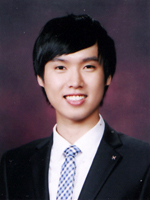 KAIST Student Awarded Prize from Energy Saving Contest
Jun-Min Kwon, an undergraduate student in the Department of Chemistry at KAIST, was awarded a prize from the Ministry of Trade, Industry and Energy, Republic of Korea, at the 35th Energy Saving Contest which was held on November 20.
The student club he has been leading was also selected as one of the best groups by the Save Energy Save Earth (SESE), a volunteer organization supported by the Korea Energy Management Corporation and the Ministry of Knowledge Economy, Republic of Korea.
Kwon began promoting energy conservation through a blog and participated in related meetings and workshops as a high school student to improve the understanding on the importance of energy saving and recycling.He also received awards from the Second National Assembly Forum on Climate Change, the Korean National Science Fair, as well as the Samsung Human Tech Paper Award.
2013.12.24 View 14461
KAIST Student Awarded Prize from Energy Saving Contest
Jun-Min Kwon, an undergraduate student in the Department of Chemistry at KAIST, was awarded a prize from the Ministry of Trade, Industry and Energy, Republic of Korea, at the 35th Energy Saving Contest which was held on November 20.
The student club he has been leading was also selected as one of the best groups by the Save Energy Save Earth (SESE), a volunteer organization supported by the Korea Energy Management Corporation and the Ministry of Knowledge Economy, Republic of Korea.
Kwon began promoting energy conservation through a blog and participated in related meetings and workshops as a high school student to improve the understanding on the importance of energy saving and recycling.He also received awards from the Second National Assembly Forum on Climate Change, the Korean National Science Fair, as well as the Samsung Human Tech Paper Award.
2013.12.24 View 14461 -
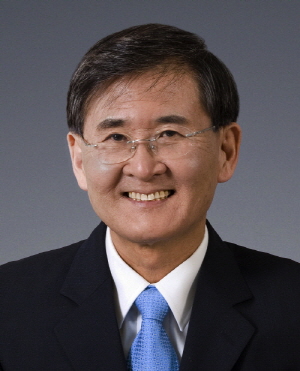 The World Economic Forum Invites KAIST to 2014 Davos Forum
President Steve Kang and Distinguished Professor Sang Yup Lee have been invited by the World Economic Forum (WEF) to attend its annual meeting slated for January 22-25, 2014 in Davos-Klosters, Switzerland.
The president will also join the Global University Leaders Forum (GULF) to be held during the annual meeting. The GULF consists of leading research universities throughout the world, at which President Kang will address agenda related to higher education and research.
From September 11th to 13th, KAIST was invited to the WEF’s 2013 Summer Davos Forum held in Dalian, China. The Summer Davos Forum is recognized as a barometer of the world economy, and KAIST hosted three sessions there.
In a session titled “Smart Regulations,” Professor Sang Yup Lee hosted presentations and discussions under the topic of “How regulation models can strengthen technical innovation and expansion.” President Steve Kang, Peter Sands, CEO of Standard Chartered Bank Group, Mark Weinberger, CEO of Ernest & Young, and Peter Terium, CEO of RWE, participated in the discussions.
The KAIST delegates also presented and participated in a session titled “From Trade Center to Innovative Hub” to discuss how to lead innovations in Asia, as well as “Marine Resources: Finding New Frontier” to address issues of how to develop and manage oceanic resources for potential growth.
President Kang said, “The World Economic Forum allows us to introduce the results of our innovative and creative research to global leaders and to demonstrate that our global position continues to grow.”
The WEF has been hosting Summer Davos Forum in China since 2007. About 1,500 participants from over 90 countries joined in this year’s summer forum under the theme of “Innovation: Inevitable Mainstream.” New strategies for innovations and solutions for global threats were suggested through presentations and discussions in 125 sessions.
The World Economic Forum (WEF) is an independent, international, and non-profit organization based in Geneva, Switzerland. It is committed to improving the state of the world by engaging business, political, academic, and government leaders to shape global, regional and industry agenda.
Among the meetings and forums organized by the WEF, its annual meeting held each January in Davos, a.k.a. the Davos Forum, has been the best known gathering. The Davos Forum brings together some 2,500 top business leaders, international political leaders, selected intellectuals and journalists to discuss the most pressing issues facing the world including health and environment.
2013.11.07 View 12433
The World Economic Forum Invites KAIST to 2014 Davos Forum
President Steve Kang and Distinguished Professor Sang Yup Lee have been invited by the World Economic Forum (WEF) to attend its annual meeting slated for January 22-25, 2014 in Davos-Klosters, Switzerland.
The president will also join the Global University Leaders Forum (GULF) to be held during the annual meeting. The GULF consists of leading research universities throughout the world, at which President Kang will address agenda related to higher education and research.
From September 11th to 13th, KAIST was invited to the WEF’s 2013 Summer Davos Forum held in Dalian, China. The Summer Davos Forum is recognized as a barometer of the world economy, and KAIST hosted three sessions there.
In a session titled “Smart Regulations,” Professor Sang Yup Lee hosted presentations and discussions under the topic of “How regulation models can strengthen technical innovation and expansion.” President Steve Kang, Peter Sands, CEO of Standard Chartered Bank Group, Mark Weinberger, CEO of Ernest & Young, and Peter Terium, CEO of RWE, participated in the discussions.
The KAIST delegates also presented and participated in a session titled “From Trade Center to Innovative Hub” to discuss how to lead innovations in Asia, as well as “Marine Resources: Finding New Frontier” to address issues of how to develop and manage oceanic resources for potential growth.
President Kang said, “The World Economic Forum allows us to introduce the results of our innovative and creative research to global leaders and to demonstrate that our global position continues to grow.”
The WEF has been hosting Summer Davos Forum in China since 2007. About 1,500 participants from over 90 countries joined in this year’s summer forum under the theme of “Innovation: Inevitable Mainstream.” New strategies for innovations and solutions for global threats were suggested through presentations and discussions in 125 sessions.
The World Economic Forum (WEF) is an independent, international, and non-profit organization based in Geneva, Switzerland. It is committed to improving the state of the world by engaging business, political, academic, and government leaders to shape global, regional and industry agenda.
Among the meetings and forums organized by the WEF, its annual meeting held each January in Davos, a.k.a. the Davos Forum, has been the best known gathering. The Davos Forum brings together some 2,500 top business leaders, international political leaders, selected intellectuals and journalists to discuss the most pressing issues facing the world including health and environment.
2013.11.07 View 12433 -
 Top Ten Ways Biotechnology Could Improve Our Everyday Life
The Global Agenda Council on Biotechnology, one of the global networks under the World Economic Forum, which is composed of the world’s leading experts in the field of biotechnology, announced on February 25, 2013 that the council has indentified “ten most important biotechnologies” that could help meet rapidly growing demand for energy, food, nutrition, and health. These new technologies, the council said, also have the potential to increase productivity and create new jobs.
“The technologies selected by the members of the Global Agenda Council on Biotechnology represent almost all types of biotechnology.Utilization of waste, personalized medicine,and ocean agricultureare examples of the challenges where biotechnology can offer solutions,”said Sang Yup Lee, Chair of the Global Agenda Council on Biotechnology and Distinguished Professor in the Department of Chemical and Biomolecular Engineering at the Korea Advanced Institute of Science and Technology (KAIST). He also added that “the members of the council concluded that regulatory certainty, public perception, and investment are the key enablers for the growth of biotechnology.”
These ideas will be further explored during “Biotechnology Week” at the World Economic Forum’s Blog (http://wef.ch/blog) from Monday, 25 February, 2013. The full list follows below:
Bio-based sustainable production of chemicals, energy, fuels and materials
Through the last century, human activity has depleted approximately half of the world’s reserves of fossil hydrocarbons. These reserves, which took over 600 million years to accumulate, are non-renewable and their extraction, refining and use contribute significantly to human emissions of greenhouse gases and the warming of our planet. In order to sustain human development going forward, a carbon-neutral alternative must be implemented. The key promising technology is biological synthesis; that is, bio-based production of chemicals, fuels and materials from plants that can be re-grown.
Engineering sustainable food production
The continuing increase in our numbers and affluence are posing growing challenges to the ability of humanity to produce adequate food (as well as feed, and now fuel). Although controversial, modern genetic modification of crops has supported growth in agricultural productivity. In 2011, 16.7 million farmers grew biotechnology-developed crops on almost 400 million acres in 29 countries, 19 of which were developing countries. Properly managed, such crops have the potential to lower both pesticide use and tilling which erodes soil.
Sea-water based bio-processes
Over 70% of the earth surface is covered by seawater, and it is the most abundant water source available on the planet. But we are yet to discover the full potential of it. For example with halliophic bacteria capable of growing in the seawater can be engineered to grow faster and produce useful products including chemicals, fuels and polymeric materials. Ocean agriculture is also a promising technology. It is based on the photosynthetic biomass from the oceans, like macroalgae and microalgae.
Non-resource draining zero waste bio-processing
The sustainable goal of zero waste may become a reality with biotechnology. Waste streams can be processed at bio-refineries and turned into valuable chemicals and fuels, thereby closing the loop of production with no net waste. Advances in biotechnology are now allowing lower cost, less draining inputs to be used, including methane, and waste heat. These advances are simplifying waste streams with the potential to reduce toxicity as well as support their use in other processes, moving society progressively closer to the sustainable goal of zero waste.
Using carbon dioxide as a raw material
Biotechnology is poised to contribute solutions to mitigate the growing threat of rising CO2 levels. Recent advances are rapidly increasing our understanding of how living organisms consume and use CO2. By harnessing the power of these natural biological systems, scientists are engineering a new wave of approaches to convert waste CO2 and C1 molecules into energy, fuels, chemicals, and new materials.
Regenerative medicine
Regenerative medicine has become increasingly important due to both increased longevity and treatment of injury. Tissue engineering based on various bio-materials has been developed to speed up the regenerative medicine. Recently, stem cells, especially the induced pluripotent stem cells (iPS), have provided another great opportunity for regenerative medicine. Combination of tissue engineering and stem cell (including iPS) technologies will allow replacements of damaged or old human organs with functional ones in the near future.
Rapid and precise development and manufacturing of medicine and vaccines
A global pandemic remains one of the most real and serious threats to humanity. Biotechnology has the potential to rapidly identify biological threats, develop and manufacture potential cures. Leading edge biotechnology is now offering the potential to rapidly produce therapeutics and vaccines against virtually any target. These technologies, including messenger therapeutics, targeted immunotherapies, conjugated nanoparticles, and structure-based engineering, have already produced candidates with substantial potential to improve human health globally.
Accurate, fast, cheap, and personalized diagnostics and prognostics
Identification of better targets and combining nanotechnology and information technology it will be possible to develop rapid, accurate, personalized and inexpensive diagnostics and prognostics systems.
Bio-tech improvements to soil and water
Arable land and fresh water are two of the most important, yet limited, resources on earth. Abuse and mis-appropriation have threatened these resources, as the demand on them has increased. Advances in biotechnology have already yielded technologies that can restore the vitality and viability of these resources. A new generation of technologies: bio-remediation, bio-regeneration and bio-augmentation are being developed, offering the potential to not only further restore these resources, but also augment their potential.
Advanced healthcare through genome sequencing
It took more than 13 years and $1.5 billion to sequence the first human genome and today we can sequence a complete human genome in a single day for less than $1,000. When we analyze the roughly 3 billion base pairs in such a sequence we find that we differ from each other in several million of these base pairs. In the vast majority of cases these difference do not cause any issues but in rare cases they cause disease, or susceptibility to disease. Medical research and practice will increasingly be driven by our understanding of such genetic variations together with their phenotypic consequences.
2013.03.19 View 13405
Top Ten Ways Biotechnology Could Improve Our Everyday Life
The Global Agenda Council on Biotechnology, one of the global networks under the World Economic Forum, which is composed of the world’s leading experts in the field of biotechnology, announced on February 25, 2013 that the council has indentified “ten most important biotechnologies” that could help meet rapidly growing demand for energy, food, nutrition, and health. These new technologies, the council said, also have the potential to increase productivity and create new jobs.
“The technologies selected by the members of the Global Agenda Council on Biotechnology represent almost all types of biotechnology.Utilization of waste, personalized medicine,and ocean agricultureare examples of the challenges where biotechnology can offer solutions,”said Sang Yup Lee, Chair of the Global Agenda Council on Biotechnology and Distinguished Professor in the Department of Chemical and Biomolecular Engineering at the Korea Advanced Institute of Science and Technology (KAIST). He also added that “the members of the council concluded that regulatory certainty, public perception, and investment are the key enablers for the growth of biotechnology.”
These ideas will be further explored during “Biotechnology Week” at the World Economic Forum’s Blog (http://wef.ch/blog) from Monday, 25 February, 2013. The full list follows below:
Bio-based sustainable production of chemicals, energy, fuels and materials
Through the last century, human activity has depleted approximately half of the world’s reserves of fossil hydrocarbons. These reserves, which took over 600 million years to accumulate, are non-renewable and their extraction, refining and use contribute significantly to human emissions of greenhouse gases and the warming of our planet. In order to sustain human development going forward, a carbon-neutral alternative must be implemented. The key promising technology is biological synthesis; that is, bio-based production of chemicals, fuels and materials from plants that can be re-grown.
Engineering sustainable food production
The continuing increase in our numbers and affluence are posing growing challenges to the ability of humanity to produce adequate food (as well as feed, and now fuel). Although controversial, modern genetic modification of crops has supported growth in agricultural productivity. In 2011, 16.7 million farmers grew biotechnology-developed crops on almost 400 million acres in 29 countries, 19 of which were developing countries. Properly managed, such crops have the potential to lower both pesticide use and tilling which erodes soil.
Sea-water based bio-processes
Over 70% of the earth surface is covered by seawater, and it is the most abundant water source available on the planet. But we are yet to discover the full potential of it. For example with halliophic bacteria capable of growing in the seawater can be engineered to grow faster and produce useful products including chemicals, fuels and polymeric materials. Ocean agriculture is also a promising technology. It is based on the photosynthetic biomass from the oceans, like macroalgae and microalgae.
Non-resource draining zero waste bio-processing
The sustainable goal of zero waste may become a reality with biotechnology. Waste streams can be processed at bio-refineries and turned into valuable chemicals and fuels, thereby closing the loop of production with no net waste. Advances in biotechnology are now allowing lower cost, less draining inputs to be used, including methane, and waste heat. These advances are simplifying waste streams with the potential to reduce toxicity as well as support their use in other processes, moving society progressively closer to the sustainable goal of zero waste.
Using carbon dioxide as a raw material
Biotechnology is poised to contribute solutions to mitigate the growing threat of rising CO2 levels. Recent advances are rapidly increasing our understanding of how living organisms consume and use CO2. By harnessing the power of these natural biological systems, scientists are engineering a new wave of approaches to convert waste CO2 and C1 molecules into energy, fuels, chemicals, and new materials.
Regenerative medicine
Regenerative medicine has become increasingly important due to both increased longevity and treatment of injury. Tissue engineering based on various bio-materials has been developed to speed up the regenerative medicine. Recently, stem cells, especially the induced pluripotent stem cells (iPS), have provided another great opportunity for regenerative medicine. Combination of tissue engineering and stem cell (including iPS) technologies will allow replacements of damaged or old human organs with functional ones in the near future.
Rapid and precise development and manufacturing of medicine and vaccines
A global pandemic remains one of the most real and serious threats to humanity. Biotechnology has the potential to rapidly identify biological threats, develop and manufacture potential cures. Leading edge biotechnology is now offering the potential to rapidly produce therapeutics and vaccines against virtually any target. These technologies, including messenger therapeutics, targeted immunotherapies, conjugated nanoparticles, and structure-based engineering, have already produced candidates with substantial potential to improve human health globally.
Accurate, fast, cheap, and personalized diagnostics and prognostics
Identification of better targets and combining nanotechnology and information technology it will be possible to develop rapid, accurate, personalized and inexpensive diagnostics and prognostics systems.
Bio-tech improvements to soil and water
Arable land and fresh water are two of the most important, yet limited, resources on earth. Abuse and mis-appropriation have threatened these resources, as the demand on them has increased. Advances in biotechnology have already yielded technologies that can restore the vitality and viability of these resources. A new generation of technologies: bio-remediation, bio-regeneration and bio-augmentation are being developed, offering the potential to not only further restore these resources, but also augment their potential.
Advanced healthcare through genome sequencing
It took more than 13 years and $1.5 billion to sequence the first human genome and today we can sequence a complete human genome in a single day for less than $1,000. When we analyze the roughly 3 billion base pairs in such a sequence we find that we differ from each other in several million of these base pairs. In the vast majority of cases these difference do not cause any issues but in rare cases they cause disease, or susceptibility to disease. Medical research and practice will increasingly be driven by our understanding of such genetic variations together with their phenotypic consequences.
2013.03.19 View 13405 -
 International Forum on Electric Vehicles 2012
KAIST hosted the International Forum on Electric Vehicles 2012 was held on the 7th of November.
IFEV provided the opportunity for domestic and international front runners of future transportation technology research to come together and discuss the direction and possibility of commercialization of electric vehicles.
The keynote speaker of the forum was Hong Soon Man Director of Korea Railroad Research Institute. Lectures were given by distinguished speakers including Kim Gyung Chul Director of Korea Transportation Research Institute, Takashi Ohira Professor at Toyohashi University of Technology, Tomoyuki Shinkai Professor at Keio University, Christian Kobel Director of Development at Germany’s Bombardier, and Peter Burggraef Professor at Rheinisch University of Technology.
Four topics will be debated on: Future road vehicles and wireless power technology, future high speed railway system, future maritime transportation system, and strategy and policy for green transportation technology.
The IFEV is expected to yield a positive result by allowing government, academia, and industry to come together and discuss the direction of future transportation technology and its social implications.
Detailed information can be found at http://gt.kaist.ac.kr/ifev2012/
2012.11.29 View 8840
International Forum on Electric Vehicles 2012
KAIST hosted the International Forum on Electric Vehicles 2012 was held on the 7th of November.
IFEV provided the opportunity for domestic and international front runners of future transportation technology research to come together and discuss the direction and possibility of commercialization of electric vehicles.
The keynote speaker of the forum was Hong Soon Man Director of Korea Railroad Research Institute. Lectures were given by distinguished speakers including Kim Gyung Chul Director of Korea Transportation Research Institute, Takashi Ohira Professor at Toyohashi University of Technology, Tomoyuki Shinkai Professor at Keio University, Christian Kobel Director of Development at Germany’s Bombardier, and Peter Burggraef Professor at Rheinisch University of Technology.
Four topics will be debated on: Future road vehicles and wireless power technology, future high speed railway system, future maritime transportation system, and strategy and policy for green transportation technology.
The IFEV is expected to yield a positive result by allowing government, academia, and industry to come together and discuss the direction of future transportation technology and its social implications.
Detailed information can be found at http://gt.kaist.ac.kr/ifev2012/
2012.11.29 View 8840